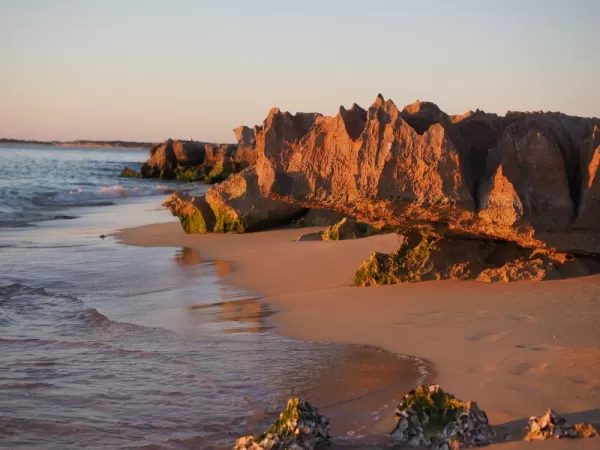Your Expedition Team may make changes to the itinerary in order to maximize your expedition experience. Below are the key destinations to visit.
Sea Day
Spend the day at sea taking part in onboard programs, educational talks, and social activities with other travelers.
Abrolhos Islands – Pelsaert (Southern) Group
Tour Liddon Pearl Farm and watch crayfishing operations on Post Office Island. Discover pearl cultivation techniques and shell types from families working in the Abrolhos waters for generations. Snorkel in blue holes from the jetty among coral formations and marine life.
Abrolhos Islands – Easter Group
Observe the sea lion colony on Little Sandy Island, the largest in the Abrolhos. Swim and snorkel alongside Australian sea lions in protected waters. Snorkel at Squid Hole, Anemone Lump, or Morley Island to explore thriving coral reefs and diverse marine species.
Abrolhos Islands – Wallabi Group
Snorkel along beaches and spot tammar wallabies, skinks, and Abrolhos dwarf bearded dragons. Cruise past the Pidgeon Islands, a coral-lagooned area rich in marine life and fishing history. If conditions allow, visit Beacon Island, known for the Batavia mutiny event 400 years ago.
Shark Bay World Heritage Area
Discover Australia's first Western Australian UNESCO World Heritage site. Explore diverse landscapes, unique plants, and 35% of the country’s bird species. Visit Dirk Hartog Island, Francois Peron National Park, and hike the Wanamalu Trail at Cape Peron if conditions allow.
Exmouth & Cape Range National Park (Ningaloo Reef)
Take a bus tour through Cape Range National Park. Snorkel at Turquoise Bay to experience the narrow continental shelf, where reefs, deep waters, and coastal life converge to support abundant marine species.
Muiron Islands
Travel 10 nautical miles off Northwest Cape to snorkel and dive in vibrant reef systems. See soft corals, turtles, schools of fish, and manta rays. Explore swim-throughs and ledges hiding nudibranchs, eels, and angelfish in calm waters.
Montebello Islands
Visit the Montebello Islands, home to fairy and roseate tern populations. Explore Alpha and Trimouille Islands, sites of British atomic tests in the 1950s. See the Ground Zero plinth reclaimed by nature and spot rare rufous hare wallabies.
Dampier Archipelago
Explore the islands’ contrasts with turquoise waters and observe petroglyphs guided by the Murujuga Land and Sea Rangers. Visit nature reserves preserving Aboriginal and European heritage, including Yaburara rock engravings, shell middens, and stone arrangements.























